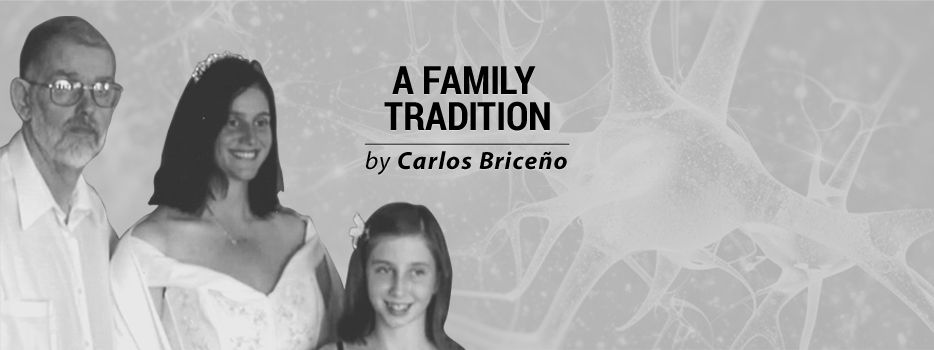The Definition of a Caregiver

At some point in the history of mankind, someone said, “Let’s raise awareness about [topic A].” And because “imitation is the sincerest form of flattery,” as Oscar Wilde noted, someone else said, “Hey, if they can raise awareness about [topic A], let’s celebrate our favorite topic.”
Now, January is Walk Your Dog Month, February is Boost Your Self-Esteem Month, and one of my all-time favorites, May 29 is “Put a Pillow on Your Fridge Day.”
This month is National Family Caregivers Month.
As a caregiver to a spouse and daughter with Huntington’s disease, I realize I am in a sacred position. Caring for another person is an awesome responsibility, but also one that touches upon the deeper aspects of what makes us human. Someone we love needs help. So, we extend our heart, soul, hands, mind, actions, thoughts, prayers, and words to help them.
With that in mind, I want to inspire other caregivers out there to realize that it is an opportunity — not to throw a pity party or to be depressed, but to elevate oneself and those being cared for to greatness.
Allow me to elaborate by using each letter of the word “caregiver.”
Compassionate: Compassion combines the Latin root words of “pati,” meaning “to suffer,” and “com-,” meaning “with” or “together.” Put them together, and we end up with “to suffer with.”
Having compassion involves taking action, which is what separates it from similar words such as empathy or sympathy.
If you are a caregiver and someone you love is suffering, showing compassion means helping that person deal with their suffering, because you know what they’re going through. It’s intense to be “com-pati. But the person suffering also is encountering intensity in the form of whatever disease or illness they’re dealing with. They deserve your compassion, and for your humanity to burst with action.
Alert: When my wife, Jill, first started showing signs that she probably had Huntington’s, the symptoms were subtle, such as slight twitching. Aware that involuntary muscle movements are a symptom of the disease, I knew she might have it, while she didn’t even realize she was twitching.
Being alert like this helps the caregiver to be the eyes and the ears for the person being cared for.
During quarterly visits to the doctor, Jill also relies on me to tell the doctor anything else I observe. By staying alert, caregivers can really help with a patient’s care. This includes observing any psychological changes.
Anything that can help improve care should be reported to a medical professional. It also might lead to adjustments at their workplace or home, or to their healthcare. Thus, being alert can make a huge difference in a patient’s quality of life and care.
Resourceful: Just as it takes a village to raise a child, it also takes a bunch of resources to help someone deal with a rare illness.
Being able to connect the dots requires someone to be resourceful, which means expanding the imagination to get the help that both the patient and the caregiver need. Being resourceful means tapping into helpful ideas and networks. A caregiver can’t do it alone, which is why being resourceful can be an invaluable mindset.
Empathetic: Empathy means “feeling with” someone else and looking at the world from their perspective. One great way I heard it defined was imagining if my heart were in your chest.
When someone is anxious, hurting, or scared, it often may seem to them that no one understands what they are going through. But the caregiver must. And by growing in empathy, the caregiver is able to love the person being cared for, and can help meet their needs in more productive ways.
Grateful: Life is so short, yet suffering lasts so long. Everything is a gift. Good health and time spent together are gifts. Even suffering can be a gift because it helps people focus on what is important in life.
Important: The one being cared for is important. But so are the caregivers. If you are a caregiver, make sure to get the necessary help and respite.
Virtuous: Patience, love, fortitude, courage, magnanimity, faith, and hope are all virtues. Grow in them, as you will need them.
Excellent: Be excellent in all you do to provide care, as it’s the attitude of champions.
Realistic: Accept that caregiving is hard. It may last for months or years. You are not superhuman.
***
Note: Huntington’s Disease News is strictly a news and information website about the disease. It does not provide medical advice, diagnosis, or treatment. This content is not intended to be a substitute for professional medical advice, diagnosis, or treatment. Always seek the advice of your physician or other qualified health provider with any questions you may have regarding a medical condition. Never disregard professional medical advice or delay in seeking it because of something you have read on this website. The opinions expressed in this column are not those of Huntington’s Disease News or its parent company, Bionews, and are intended to spark discussion about issues pertaining to Huntington’s disease.







Leave a comment
Fill in the required fields to post. Your email address will not be published.